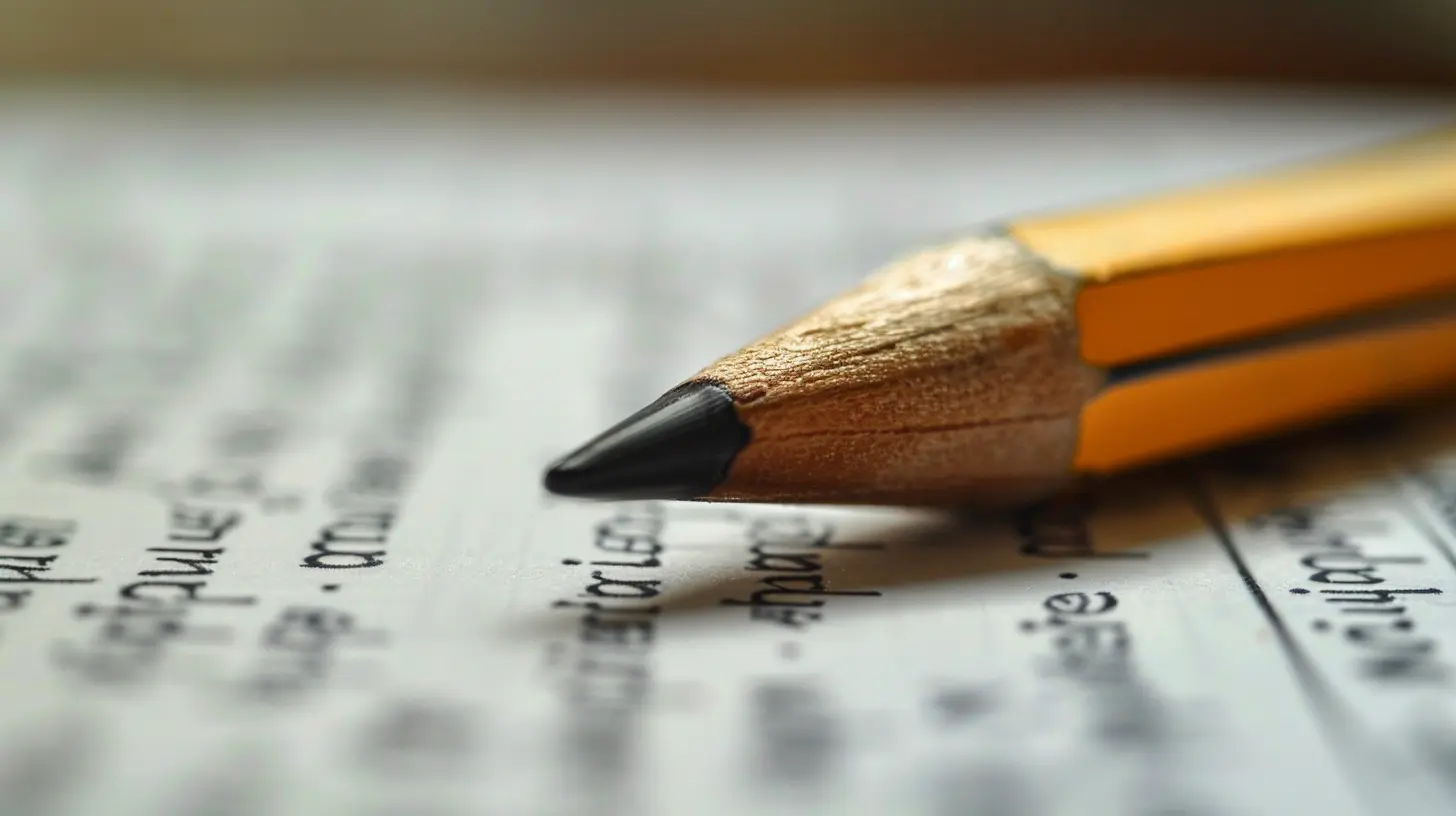17 July 2025
Let's face it, standardized tests can feel like a battle of the brains — full of tricky questions, time pressure, and yes... tons of unfamiliar words. So, what's the secret weapon? You guessed it: vocabulary. 🎯
Your vocabulary isn't just another thing to memorize — it's your superpower for crushing those verbal sections. Whether you're tackling the SAT, GRE, ACT, or TOEFL, a strong word bank can skyrocket your confidence and your score. So grab a notebook (or your favorite app), and let’s dive into how to build a powerful vocabulary without feeling bored out of your mind.

Why Vocabulary Matters So Much
Okay, real talk — why should you care about vocabulary in the first place?Well, imagine you're reading a complicated passage or answering tricky multiple-choice questions. If you’re constantly tripping over unknown words, it’s like trying to run a marathon with untied shoelaces. Not fun, right?
A solid vocabulary helps you:
- Understand reading passages faster ✅
- Choose correct answers with more confidence ✅
- Avoid falling into trap answers ✅
- Score higher on verbal or reading comprehension sections ✅
Words aren’t just words; they’re the keys to understanding and communicating like a pro. So yeah... they matter. A LOT.

Step 1: Start With the Right Word List
Here’s the deal — not all words are created equal, especially when it comes to standardized tests.📝 You don’t need to know every fancy word in the dictionary. You just need to focus on the high-frequency ones that actually show up on the test.
Go-To Word Lists for Tests
- SAT/ACT: Look for SAT Power Vocab or Barron’s SAT Word List- GRE: Use the Manhattan GRE 500 Essential Words or Magoosh’s GRE Vocab List
- TOEFL/IELTS: Try Academic Word List (AWL) or TOEFL Vocabulary Flashcards
Stick to a word list that matches your test. These lists are carefully curated based on actual test data — meaning less guesswork for you and more results.
Pro Tip: Don’t bite off more than you can chew. Start with 10–15 words a day. That’s it. Slow and steady wins the vocab race. 🐢➡️🐇

Step 2: Make Flashcards Your Best Friend
Flashcards might sound old-school, but they WORK — and there’s a reason why every top scorer swears by them.You can go the paper route (index cards FTW!) or use cool digital tools like:
- Anki (Super customizable & uses spaced repetition)
- Quizlet (Great for visual learners)
- Memrise (Fun, gamified learning)
How to Make Killer Flashcards
Each card should include:- The word
- A simple definition (in your own words!)
- An example sentence
- Synonyms/Antonyms (Optional but helpful)
Example:
Word: Ubiquitous
Definition: Found everywhere; super common
Sentence: Starbucks is so ubiquitous, you can find one on almost every corner.
Synonyms: Omnipresent, widespread
Using flashcards regularly makes words stick in your memory — especially if you review them in short, quick sessions daily.

Step 3: Read Like Your Score Depends on It (Because It Does)
Reading is the secret shortcut to expanding your vocabulary — without even trying too hard.But here’s the catch: What you read matters.
Best Reads for Vocab Gain
- Newspapers: The New York Times, The Guardian- Magazines: The Economist, Time, National Geographic
- Nonfiction books on science, history, or culture
- Literature: Novels by classic authors like Jane Austen or modern writers like Zadie Smith
As you read, highlight or jot down unfamiliar words. Then look them up, write them in your notebook (or flashcard), and try using them in your own sentence.
It’s like feeding your brain a balanced diet of words. 🍎📘
Step 4: Play With Words (Yes, Seriously!)
You don’t have to treat vocabulary like a boring study chore. Make it fun!Try These Word Games
- Crossword puzzles- Scrabble or Words With Friends
- Vocabulary.com Quizzes
- Wordle (Addictive AND educational!)
Playing games keeps your brain sharp and helps reinforce vocabulary in a low-pressure way. Plus, it’s a great break from textbook overload.
You’ll be surprised how many test words sneak into these games. (Ever seen “lugubrious” in a crossword? Yup, it happens.)
Step 5: Use Words in Real Life
Here’s the golden rule: If you don’t use it, you’ll lose it.The more you use new words in real conversations or writing, the faster they become a natural part of your vocabulary.
Easy Ways to Practice:
- Write a short story or journal entry using 5-10 new words- Text a friend using one "word of the day"
- Teach someone else what a new word means (teaching locks it in!)
- Use social media: Post a sentence with your word of the day on Instagram stories or Twitter
Start small. Even just using one word a day in your life can make a difference.
Step 6: Master Greek and Latin Roots
Want to unlock the meaning of hundreds of words without memorizing all of them individually? Say hello to roots, prefixes, and suffixes.For example, if you know:
- “bene” = good → benevolent, benefactor, beneficial
- “mal” = bad → malice, malicious, malfunction
- “aqua” = water → aquarium, aquatic, aqueduct
Suddenly, those long, intimidating words won’t seem so scary anymore. You’ll start to decode meanings on the spot — like a vocab detective. 🕵️
Create a list of common roots and test yourself with words that use them. This builds a strong foundation that’ll help in both the test and beyond.
Step 7: Practice With Real Test Questions
Let’s not forget the ultimate goal: test success. So yeah, practice like you’re playing in the big leagues.Use official or reputable practice materials to see:
- How words are used in context
- What types of definitions or synonyms are expected
- How wrong answers are designed to trick you
Look at each question as a learning opportunity. If you get one wrong, study the word, understand your mistake, and add that word to your study list.
The more exposure you get to the style of test questions, the more confident you’ll feel when test day rolls around.
Step 8: Track Your Progress Like a Vocabulary Ninja
Tracking your progress is the secret sauce to motivation. When you see how far you’ve come, it makes all that studying feel worth it.Try these methods:
- Keep a “Word Journal” of every new word you learn
- Make a Checklist to tick off words from your test list
- Use a Digital Tracker like Google Sheets or Notion
Even a simple “word bank” can be super useful when revising. Plus, it feels satisfying to flip through pages of words you’ve totally mastered.
Step 9: Set Realistic Goals and Stay Consistent
Look, building vocabulary isn't something that happens overnight. But the magic happens when you’re consistent.Start by setting small, realistic goals:
- “Learn 10 new words a day”
- “Review flashcards 3x a week”
- “Read one article every morning”
And here’s the fun part — reward yourself! Finished a week of studying? Treat yourself to a movie night or a Starbucks run. 🎉
Vocabulary building doesn’t have to be stressful. Think of it like planting a garden. A little work every day, and soon you’ll have a field full of words blooming in your brain.
Final Thoughts
Mastering vocabulary for standardized tests doesn’t have to be painful or boring. You’ve just got to trick your brain into having fun while learning.Mix things up with books, apps, games, and real-life usage. Be patient, be proud of every new word you learn, and remember — every word is a step closer to your dream score.
So, grab your flashcards, fire up that reading list, and let’s turn you into a vocab champion. You got this!









Rosanna McCoy
Great tips! Remember, expanding your vocabulary is like adding colorful stickers to your brain. The more you have, the more fun your test prep will be! Keep up the awesome work!
December 28, 2025 at 1:10 PM